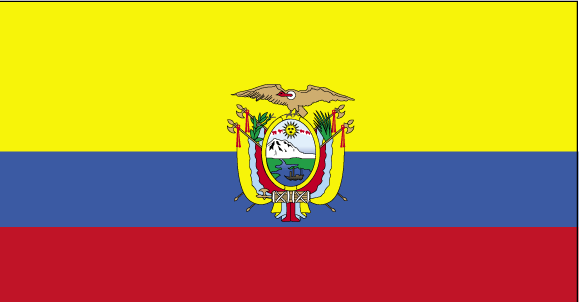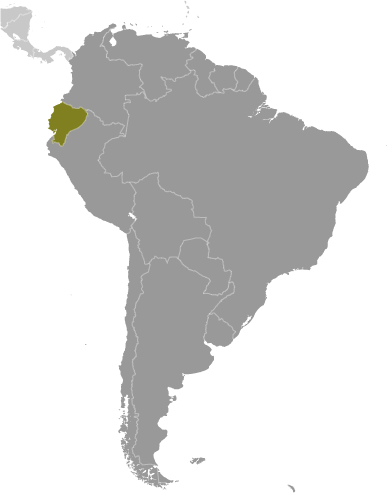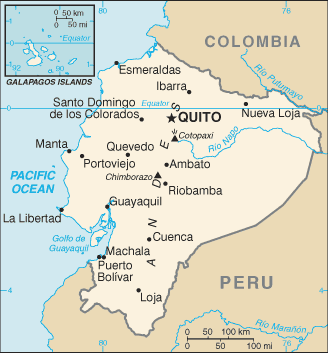What is now Ecuador formed part of the northern Inca Empire until the Spanish conquest in 1533. Quito became a seat of Spanish colonial government in 1563 and part of the Viceroyalty of New Granada in 1717. The territories of the Viceroyalty - New Granada (Colombia), Venezuela, and Quito - gained their independence between 1819 and 1822 and formed a federation known as Gran Colombia. When Quito withdrew in 1830, the traditional name was changed in favor of the "Republic of the Equator." Between 1904 and 1942, Ecuador lost territories in a series of conflicts with its neighbors. A border war with Peru that flared in 1995 was resolved in 1999. Although Ecuador marked 25 years of civilian governance in 2004, the period has been marred by political instability. Protests in Quito have contributed to the mid-term ouster of Ecuador's last three democratically elected Presidents. In September 2008, voters approved a new constitution; Ecuador's twentieth since gaining independence. General elections, under the new constitutional framework, were held in April 2009.
Country Name
Conventional long form:Republic of Ecuador
Conventional short form:Ecuador
Local long form:Republica del Ecuador
Local short form:Ecuador
Government Type
republic
Capital
Name:Quito
Geographic coordinates:0 13 S, 78 30 W
Time difference:UTC-5 (same time as Washington, DC during Standard Time)
Administrative divisions
24 provinces (provincias, singular - provincia); Azuay, Bolivar, Canar, Carchi, Chimborazo, Cotopaxi, El Oro, Esmeraldas, Galapagos, Guayas, Imbabura, Loja, Los Rios, Manabi, Morona-Santiago, Napo, Orellana, Pastaza, Pichincha, Santa Elena, Santo Domingo de los Tsachilas, Sucumbios, Tungurahua, Zamora-Chinchipe
Independence
24 May 1822 (from Spain)
National Holiday
Independence Day (independence of Quito), 10 August (1809)
Constitution
20 October 2008
Legal system
based on civil law system; has not accepted compulsory ICJ jurisdiction
Suffrage
16 years of age; universal, compulsory for persons ages 18-65, optional for other eligible voters
Executive branch
Chief of state:President Rafael CORREA Delgado (since 15 January 2007); Vice President Lenin MORENO Garces (since 15 January 2007); note - the president is both the chief of state and head of government
Head of government:President Rafael CORREA Delgado (since 15 January 2007); Vice President Lenin MORENO Garces (since 15 January 2007)
Cabinet: Cabinet appointed by the president
(For more information visit the World Leaders website)
Elections:the president and vice president elected on the same ticket by popular vote for a four-year term and can be re-elected for another consecutive term; election last held on 26 April 2009 (next to be held in 2013)
Election results:President Rafael CORREA Delgado reelected president; percent of vote - Rafael CORREA Delgado 52%; Lucio GUTIERREZ 28.2%; Alvaro NOBOA 11.4%; other 8.4%
Legislative branch
unicameral National Assembly or Asamblea Nacional (124 seats; members are elected through a party-list proportional representation system to serve four-year terms)
Elections:last held on 26 April 2009 (next to be held in 2013)
Election results:percent of vote by party - NA; seats by party - PAIS 59, PSP 19, PSC 11, PRIAN 7, MPD 5, PRE 3, other 20; note - defections by members of National Assembly are commonplace, resulting in frequent changes in the numbers of seats held by the various parties
Judicial branch
National Court of Justice or Corte Nacional de Justicia (according to the Constitution, justices are elected through a procedure overseen by the Judiciary Council); Constitutional Court or Corte Constitucional (Constitutional Court justices are appointed by a commission composed of two delegates each from the Executive, Legislative, and Transparency branches of government)
Political Parties and Leaders
Alianza PAIS movement [Rafael Vicente CORREA Delgado]; Christian Democratic Union or UDC [Luis ACOSTA Moreta]; Democratic Left or ID [Dalton BACIGALUPO]; Ethical and Democratic Network or RED [Martha ROLDOS]; Institutional Renewal and National Action Party or PRIAN [Vicente TAIANO]; Pachakutik Plurinational Unity Movement - New Country or MUPP-NP [Jorge GUAMAN Coronel]; Patriotic Society Party or PSP [Lucio GUTIERREZ Borbua]; Popular Democratic Movement or MPD [Luis VILLACIS]; Roldosist Party or PRE [Abdala BUCARAM Pulley, director]; Social Christian Party or PSC [Pascual DEL CIOPPO]; Socialist Party - Broad Front or PS-FA [Silvia SALGADO]
Political pressure groups and leaders
Confederation of Indigenous Nationalities of Ecuador or CONAIE [Marlon SANTI, president]; Coordinator of Social Movements or CMS [F. Napoleon SALTOS]; Federation of Indigenous Evangelists of Ecuador or FEINE [Manuel CHUGCHILAN, president]; National Federation of Indigenous Afro-Ecuatorianos and Peasants or FENOCIN [Luis Alberto ANDRANGO Cadena, president]
International organization participation
CAN, FAO, G-77, IADB, IAEA, IBRD, ICAO, ICC, ICCt, ICRM, IDA, IFAD, IFC, IFRCS, IHO, ILO, IMF, IMO, Interpol, IOC, IOM, IPU, ISO, ITSO, ITU, ITUC, LAES, LAIA, Mercosur (associate), MIGA, MINUSTAH, NAM, OAS, OPANAL, OPCW, OPEC, PCA, RG, UN, UNASUR, UNCTAD, UNESCO, UNHCR, UNIDO, Union Latina, UNMIL, UNMIS, UNOCI, UNWTO, UPU, WCO, WFTU, WHO, WIPO, WMO, WTO
Diplomatic representation in the US
Chief of mission:Ambassador Luis Benigno GALLEGOS Chiriboga
Chancery:2535 15th Street NW, Washington, DC 20009
Telephone:[1] (202) 234-7200
FAX:[1] (202) 667-3482
Consulate(s) general:Chicago, Houston, Los Angeles, Miami, New Orleans, New York, Newark (New Jersey), San Francisco
Diplomatic representation from the US
Chief of mission:Ambassador Heather HODGES
Embassy: Avenida Avigiras E12-170 y Avenida Eloy Alfaro, Quito
Mailing address:Avenida Guayacanes N52-205 y Avenida Avigiras
Telephone:[593] (2) 398-5000
FAX:[593] (2) 398-5100
consulate(s) general: Guayaquil
Flag description
three horizontal bands of yellow (top, double width), blue, and red with the coat of arms superimposed at the center of the flag; similar to the flag of Colombia, which is shorter and does not bear a coat of arms










